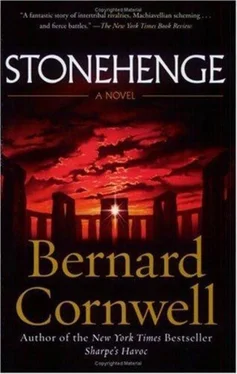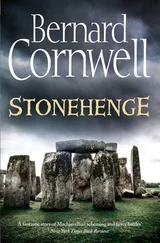'Good,' Hengall grunted.
'But the shape of the gold,' Hirac went on carefully, 'tells us it once belonged to Lahanna, and I think she tried to retrieve it. Did not Saban say the stranger was asking for Sannas?'
'He did.'
'And Sannas reveres Lahanna above all the gods,' the priest said, 'so Slaol must have sent it to us to keep it from reaching her. But Lahanna will be jealous, and she will want something from us.'
'A sacrifice?' Hengall asked suspiciously.
The priest nodded, and Hengall scowled, wondering how many cattle the priest would want to slaughter in Lahanna's temple, but Hirac did not propose any such depredation on the tribe's wealth. The gold was important, its coming was extraordinary and the response must be proportionately generous. 'The goddess will want a spirit,' the high priest said.
Hengall brightened when he realized his cattle were safe. 'You can take that fool Camaban,' the chief said, talking of his disowned second son. 'Make him useful, crush his skull.'
Hirac rocked back on his haunches, his eyes half closed. 'He is marked by Lahanna,' he said quietly. Camaban had come from his mother with a crescent birthmark on his belly and the crescent, like the lozenge, was a shape sacred to the moon. 'Lahanna might be angry if we kill him.'
'Maybe she would like his company?' Hengall suggested slyly. 'Maybe that is why she marked him? So he would be sent to her?'
'True,' Hirac allowed, and the notion emboldened him to a decision. 'We shall keep the gold,' he said, 'and placate Lahanna with the spirit of Camaban.'
'Good,' Hengall said. He turned to the leather screen and shouted a name. A slave girl crept nervously into the firelight. 'If I'm to fight Lengar in the morning,' the chief said to the high priest, 'then I'd better make another son now.' He gestured the girl to the pile of furs that was his bed.
The high priest gathered the baby's bones, then hurried to his own hut through the growing rain that washed the chalk from his skin.
The wind blew on. Lightning slithered to earth, turning the world soot-black and chalk-white. The gods were screaming and men could only cower.
Saban feared going to sleep, not because the storm god was hammering the earth, but because he thought Lengar might come in the night to punish him for taking the lozenge. But his elder brother left him undisturbed and in the dawn Saban crept from his mother's hut into a damp and chill wind. The remnants of the storm gusted patches of mist within the vast earthen bank which surrounded the settlement while the sun hid its face behind cloud, appearing only as an occasional dull disc in the vaporous grey. A thatched roof, sodden with rainwater, had collapsed in the night, and folk marvelled that the family had not been crushed. A succession of women and slaves went through the embankment's southern causeway to fetch water from the swollen river, while children carried the night's pots of urine to the tanners' pits which had been flooded, but they all hurried back, eager not to miss the confrontation between Lengar and his father. Even folk who lived beyond the great wall, in the huts up on the higher land, had heard the news and suddenly found reason to come to Ratharryn that morning. Lengar had found the Outfolk gold, Hengall wanted it, and one of the two had to prevail.
Hengall appeared first. He emerged from his hut wearing a great cape of bear fur and strolled with apparent unconcern about the settlement. He greeted Saban by ruffling his hair, then talked with the priests about the problems of replacing one of the great posts of the Temple of Lahanna, and afterwards he sat on a stool outside his hut and listened to anxious accounts of the damage done by the night's rain to the wheatfields. 'We can always buy grain,' Hengall announced in a loud voice so that as many people as possible could hear him. 'There are those who say that the wealth hidden in my hut should be used to hire weapons, but it might serve us better if we buy grain. And we have pigs to eat, and rain doesn't kill the fish in the river. We won't starve.' He opened his cloak and slapped his big bare belly. 'It won't shrink this year!' Folk laughed.
Galeth arrived with a half-dozen men and squatted near his brother's hut. All of them carried spears and Hengall understood that they had come to support him, but he made no mention of the expected confrontation. Instead he asked Galeth whether he had found an oak large enough to replace the decayed temple pole in Lahanna's shrine.
'We found it,' Galeth said, 'but we didn't cut it.'
'You didn't cut it?'
'The day was late, the axes blunt.'
Hengall grinned. 'Yet I hear your woman's pregnant?'
Galeth looked coyly pleased. His first wife had died a year before, leaving him with a son a year younger than Saban, and he had just taken a new woman. 'She is,' he admitted.
'Then at least one of your blades is sharp,' Hengall said, provoking more laughter.
The laughter died abruptly, for Lengar chose that moment to appear from his own hut, and in that grey morning he shone like the sun itself. Ralla, his mother and Hengall's oldest wife, must have sat through the stormy darkness threading the small lozenges on sinews so that her son could wear them all as necklaces, and she had sewn the four large gold pieces directly onto his deerskin jerkin over which he wore the stranger's gold-buckled belt. A dozen young warriors, all of them Lengar's close hunting companions, followed him while behind that spear-carrying band was a muddy group of excited children who waved sticks in imitation of the hunting spear in Lengar's hand.
Lengar ignored his father at first. Instead he paraded through the huts, past the two temples built within the great embankment, then up to the potters' huts and tanners' pits at the north of the enclosure. His followers clashed their spears together, and more and more folk gathered behind him so that eventually he led his excited procession in an intricate path that twisted between the rain-soaked thatch of the low round huts. Only after he had threaded the settlement twice did he turn towards his father.
Hengall stood as his son approached. He had let Lengar have his time of glory, and now he stood and shrugged the bear cloak from his shoulders and threw it, fur down, into the mud at his feet. He wiped the mist's moisture from his face with the ends of his big beard, then waited bare-chested so that all the folk in Ratharryn could see how thick the blue marks of dead enemies and slaughtered beasts clustered on his skin. He stood silent, the wind stirring his ragged black hair.
Lengar stopped opposite his father. He was as tall as Hengall, but not so heavily muscled. In a fight he would probably prove the quicker man while Hengall would be the stronger, yet Hengall showed no fear of such a fight. Instead he yawned, then nodded at his eldest son. 'You have brought me the stranger's gold. That is good.' He gestured at the bear cloak that lay on the ground between them. 'Put everything there, son,' he growled.
Lengar stiffened. Most of the watching tribe thought he would fight, for his eyes bespoke a love of violence that verged on madness, but his father's gaze was steady and Lengar chose to argue instead of striking with his spear. 'If a man finds an antler in the woods,' he demanded, 'must he give it to his father?' He spoke loudly enough for all the crowd to hear. The people of Ratharryn had clustered between the nearer huts, leaving a space for the confrontation, and some of them now called out their agreement with Lengar. 'Or if I find the honey of the wild bees,' Lengar asked, emboldened by their support, 'must I endure the stings, then yield the honey to my father?'
'Yes,' Hengall said, then yawned again. 'In the cloak, boy.'
'A warrior comes to our land,' Lengar cried, 'a stranger of the Outfolk, and he brings gold. I kill the stranger and take his gold. Is it not mine?' A few in the crowd shouted that the gold was indeed his, but not quite so many as had shouted before. Hengall's bulk and air of unconcern was unsettling.
Читать дальше
Конец ознакомительного отрывка
Купить книгу












